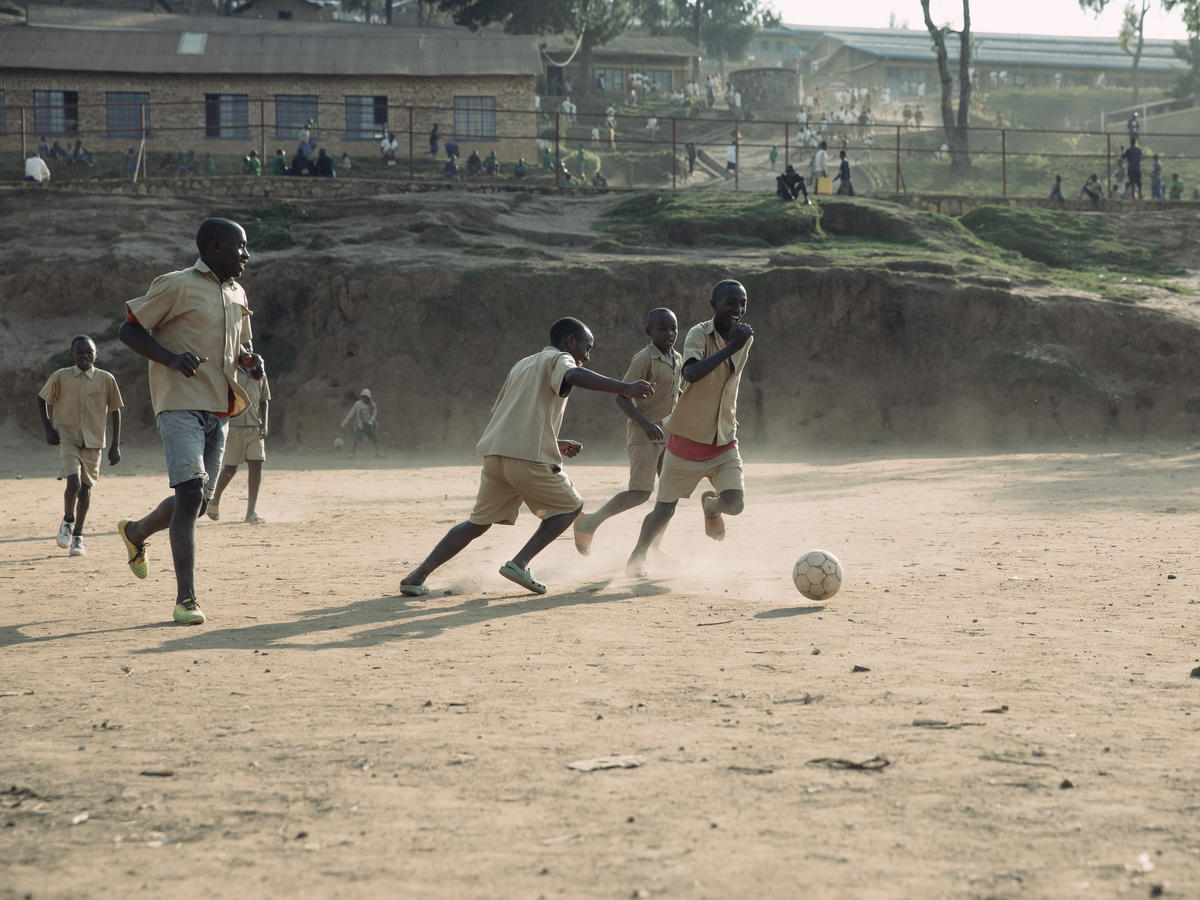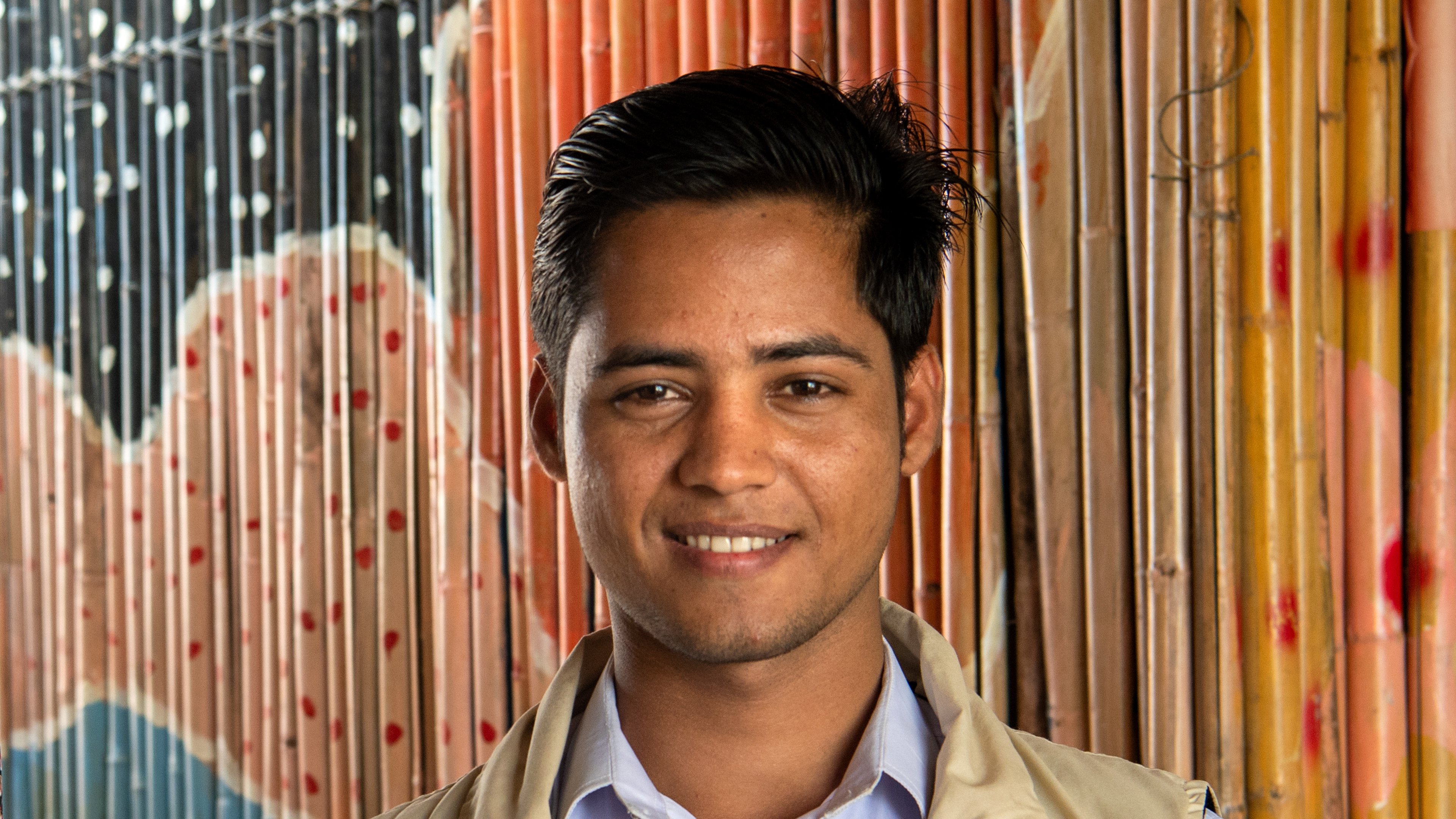Refugees share views on preventing violence against children
Refugees share views on preventing violence against children

JOHANNESBURG, South Africa, July 20 (UNHCR) - Every morning, Eder Katinda and Miriam Kwete, two refugee students in Johannesburg, brace themselves for something bad to happen at their secondary schools. If they're not being bullied or sworn at by their classmates and peers, then they can expect an unkind remark or sarcastic retort from some of their teachers.
"We get asked things like, 'Is that what they teach you where you come from?' or 'Well this is how such and such is done! If you don't understand, that's up to you!'," says Eder, trying to laugh it off. But the humiliation and rejection is clear in his eyes.
"It hurts because teachers aren't supposed to behave like this. We look up to them as role models, protectors and authority figures but many of the times, they side with some of our equally hurtful classmates," Eder adds.
Through the support of UNHCR, both Eder and Miriam are sharing their experiences in the Eastern and Southern Africa Regional Preparatory Consultation for the UN Secretary-General's Study on Violence against Children (July 18-20), through the Children's Consultation which preceded this event.
The Regional Consultation is a global initiative mandated by the UN General Assembly in 2001. It is intended to assert the rights of children to protection from all forms of violence as well as to draw attention to the scale and nature of violence, especially in its less visible forms. It also seeks to motivate States to fulfil their obligations towards the protection of children while making commitments to prevent violence and to intervene in their recovery.
The Consultation that is being hosted in Johannesburg is the ninth and final session of a worldwide initiative that began in March this year. Eder and Miriam are two of four refugee children present at the meetings.
"Refugee and returnee children experience the same kind of violence that their peers face," says Joan Allison, UNHCR's Senior Regional Advisor for Refugee Women and Children. "However, they may be more vulnerable because other than looking and sounding different, they are often excluded from global and national initiatives geared towards the protection of children. This is why we have ensured their participation here."
Eder and Miriam are among other vulnerable refugee children who have, over the years, received support through a psychosocial art project conducted under the auspices of UNHCR's Sexual and Gender-Based Violence (SGBV) programme.
"The project has been a very therapeutic exercise," says Allison. "We have found that it is easier for children to talk through drawings especially on a complex and sensitive issue such as violence. First, we talk about things they're familiar with. Then they draw all the places they go to, while talking about their work, their life. Then we ask them where violence happens and how it manifests, and they draw these on top of what they have already drawn. We then ask them how they protect themselves from these people and places and the strategies they use to protect themselves against violence."
As a result of the art project, the drawings of 97 children are now on exhibition at the Regional Consultation. The other major contribution UNHCR is making is a Qualitative Research Study on children's views on violence.
The study was conducted in three settings. The first study was of a returnee/ re-integration situation in Moxico province, Angola. The second study was conducted in Mayukwayukwa refugee camp in Zambia and the third study took place in South Africa's urban centres of Johannesburg and Cape Town.
Now completed and submitted to the Regional Consultation, the study contains findings such as girls being forced into unwanted marriages in Zambia; local people stopping returnee children from attending school, collecting water and selling goods in the market in Angola; and girls being forced into prostitution for food or money in South Africa. The study's recommendations advocate protecting children from violence, reducing discrimination and helping children cope with it as well as providing psychosocial support, among others.
"We have a child-friendly version of the report that's going back to all the 100 children who participated in it and it's also being distributed in this Consultation," says Allison. "As UNHCR, we also want to include refugees on any national or provincial programmes addressing SGBV so that we improve their access to existing services addressing violence against children."
Professor Paulo Sergio Pinheiro, a Special Independent Expert appointed by the UN Secretary-General to lead the Study on Violence against Children, says that the participation of children deserves special mention and that it is critical to hear their voices and their unique point of view about a topic that concerns them.
Miriam recalls a time when her father put her and her siblings under the guardianship of an uncle before leaving the Democratic Republic of the Congo. Despite receiving a lot of money and instructions to enrol them in school, her uncle turned the children into underage domestic workers and forbade them from attending school for three years.
"A little girl standing on a chair because she couldn't reach the sink, washing a pile of dishes, is an image that will live with me for the rest of my life," Miriam says, recalling how her rights were violated by a member of her own family.
Although the Convention on the Rights of the Child, which enjoys almost universal acceptance and has been ratified by 192 out of 194 States, is a landmark for the recognition of children's rights, Allison and Pinheiro agree that much more still needs to be done.
"The letter of law alone doesn't change traditional attitudes," says Pinheiro. "There is a need to raise awareness and constantly carry out public awareness campaigns about the negative consequences of the ill-treatment of children. If we want to build a safe environment for our children, both governments and civil society must take concrete steps to address issues of violence affecting children."
Eder and Miriam are both proud to have had the opportunity to share with their South African counterparts a refugee's perspective on violence against children at the Children's Consultation.
"As refugees, we also have a responsibility to educate our peers and elders on who we are and the rights we share with South African children," concludes Eder. "This is an ongoing exercise in my school where we have discussed, mediated and reached agreement with prefects and other authority figures, on how to, among other things, deal with the prevailing belief that all foreign children are ill-disciplined and troublesome."
He shrugs, "It's not easy changing people's attitudes, but it's a start."
The Children and Regional Consultations have been facilitated through the support of the UN Children's Fund (UNICEF) in coordination with the Office of the High Commissioner for Human Rights (OHCHR), the World Health Organisation (WHO), other UN organizations including UNHCR and local partners such as the government of South Africa.
By Pumla Rulashe
UNHCR South Africa








